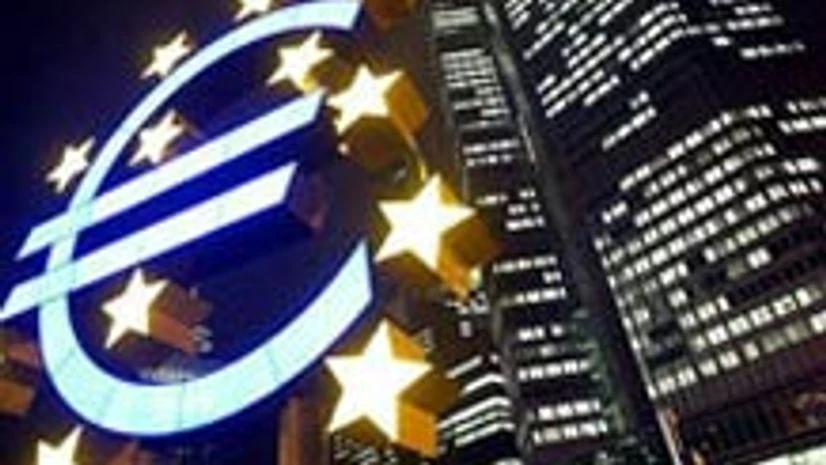The Euro area's economy emerged from a record-long recession in the second quarter, led by Germany and France, amid the first sustained period of financial-market calm since the start of the debt crisis.
Gross domestic product in the 17-nation Euro area expanded 0.3 per cent in the April-June period after a 0.3 per cent contraction in the previous three months, the European Union's statistics office in Luxembourg said on Wednesday. That exceeded the median estimate of 0.2 per cent growth in a Bloomberg News survey of 41 economists. From a year earlier, the economy shrank 0.7 per cent in the second quarter.
Germany and France, the Euro area's two largest economies, both showed faster-than-projected expansions in the quarter. While the overall outlook has improved, the recession pushed the unemployment rate to a record and parts of southern Europe remain mired in a slump, with more than half of young people in Spain and Greece out of work.
More From This Section
The euro was declined against the US dollar after the GDP data, trading at $1.3252 at 11:18 am in Brussels, down 0.1 per cent on the day.
Germany, France
In Germany, GDP increased 0.7 per cent in the second quarter, more than the 0.6 per cent gain forecast by economists. The French economy expanded 0.5 per cent after two quarters of contraction. Still, at least four of the Euro area's 17 member countries remain in recessions, including Italy and Spain.
"This slightly more positive data is welcome, but there is no room for any complacency whatsoever," EU Economic and Monetary Affairs Commissioner Olli Rehn said in a blog post. "A sustained recovery is now within reach, but only if we persevere on all fronts of our crisis response."
The European Central Bank has cut interest rates to a record low and pledged to keep them there or lower for an "extended period" to bolster the economy. With the jobless rate at 12.1 per cent, the highest since the Euro's debut in 1999, ECB President Mario Draghi this month described progress as "tentative".
Global growth
The International Monetary Fund last month cut its global growth projections, while the US Treasury Department's top international official, Lael Brainard, said Europe faces the risk of prolonged economic stagnation unless policy makers encourage domestic demand. Euro area unemployment has held at a record since March and almost a quarter of young people across the bloc are without jobs. The ECB forecasts that the euro economy will shrink 0.6 per cent this year.
While Europe's recovery inches forward, conditions in major export markets such as the US and China are improving.
In China, July industrial output rose more than economists expected after a larger-than-forecast rebound in exports eased concern that a credit squeeze in the world's second-biggest economy would curb growth sharply. The US economy grew at a 1.7 per cent annualised rate from April through June after a 1.1 per cent pace in the first quarter.
Gradual recovery
"Euro-area export growth should benefit from a gradual recovery in global demand, while domestic demand should be supported by the accommodative monetary-policy stance as well as recent gains in real income owing to generally lower inflation," Draghi said on August 1. The ECB cut its benchmark interest rate to a record low of 0.5 per cent in May and committed in July to keep it at the present level or lower for "an extended period" to foster growth.
Global companies' second-quarter earnings suggest the worst may be over for Europe. The continent's second-biggest automaker, PSA Peugeot Citroen, reported a smaller operating loss for the second quarter than analysts had projected and French car sales rose in July for the first time in almost two years. Henkel AG, the German maker of Loctite glue, reported second-quarter earnings that beat estimates.
Borrowing costs
Sovereign borrowing costs have dropped across the bloc this year. Italy's and Spain's 10-year yield premium over benchmark German bunds shrank to the smallest in two years on Tuesday. The spread narrowed to 237 basis points for Italy, the least since July 22, 2011, and compared with a euro-era record of 575 basis points in November 2011. For Spain, it shrank to 265 basis points, the tightest since Aug. 16, 2011, down from 650 basis points in July 2012, when Draghi pledged to do whatever was necessary to hold the single currency together.
The yield on Spain's 10-year debt was at 4.45 per cent at 11:18 am in Brussels. The yields for similar maturities were at 1.81 per cent for Germany, 2.35 per cent for France and 4.20 per cent for Italy.
Wednesday's GDP report is a first estimate for the April-June period. The statistics office is scheduled to publish a breakdown of second-quarter GDP next month.

)
